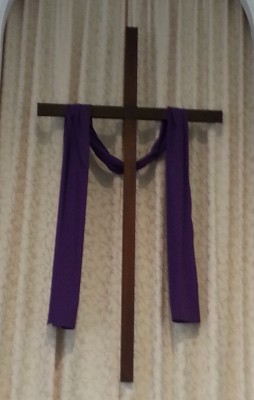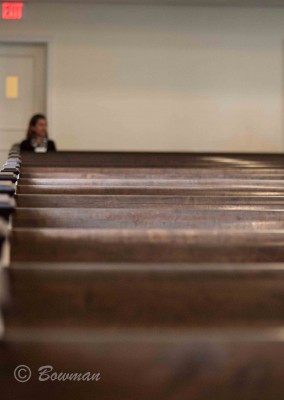Ash Wednesday Service Reflections
Nada te Turbe
Posted on Apr 15, 2014 in 2014, Newsletter Articles, Pastor's Blog, Sermons
Lent: Returning on Purpose
2 Corinthians 5:14-19, Romans 5:12-19
Chris Bowman @ Oakton Church of the Brethren 20140309
The season of Lent began at the Ash Wednesday service. For the very first time ever, all three of the congregations who worship here… The Disciples Mission Korean Methodist Church, and the Iglesia de Dios Pentecostal Monte de Horeb Hispanic Church, and the Oakton Church of the Brethren church worshiped together.
Our bulletin including an 14- page insert of Bible readings in Spanish, English, and Korean. And that evening, four experiences started Lent for me—this season of reconciliation.
First, without any prompting from me, before the service began, Oakton Church members went out of their way to introduce themselves and welcome our guests in.their.own.languages.
Several of our Spanish-speaking members visiting with the Hispanic church folks … who were all sitting together in the back three rows, by themselves. And the next thing I know I saw our Korean-speaking members visiting with the Korean-church folks. Bowing and smiling and welcoming in their own language.
And there were children! Beautiful, shy, curious kids who were welcomed with smiles and waves in a language all their own. It was as though the line that divided us was being erased by love and acceptance, here, at the beginning of Lent. And we entered into Worship, reconciled to God who first reconciled us unto himself and gave to us this ministry of reconciliation.
I was so proud … I almost burst my buttons!
And a second thing happened. After the service started, the entire Hispanic group, got up and moved forward.
Like many people who are uncertain of what they just got themselves into … unsure of whether we are really welcome … not feeling we belong we huddle on the edges.
Perhaps it was because you welcomed them in their own language so genuinely. But for whatever reason they moved … forward … quite a ways forward. And I saw pastor Diaz smile.
The Edge of Faith
You don’t know how much it means to those whom you’ve called to lead in worship to have people lean into the Word we’ve wrestled with in preparation. You’ve done that for me … and I really appreciate it … And here our guests did it and nobody had to ask them, or marry them to move them forward in the pews.
It was like an empty gap between us was filled and a line that separated us erased here, at the beginning of Lent. And we entered into Worship, reconciled to God who reconciled us unto himself and gave to us the ministry of reconciliation.
And there was a third moment I want to share with you. It’s the moment pastor Diaz started singing.
Before the service I had noticed that pastor Diaz stood off, by himself. He is a shy man and very self-conscious about his English. So I was glad when the five of us who would be leading the service met together in the prayer room there off the narthex to pray. As I looked around the room I thought, “what an interesting group we are”: A Korean pastor representing a church that has met in our facility for decades but only recently joined us for services like Love Feast and the International Day of Prayers of Peace.
Next to him was a Hispanic Pentecostal — and I don’t know which of those descriptions feels more foreign to this stoic Brethren, white-boy: Pentecostal or Hispanic.
There, in the circle, was a woman who was raised in a church tradition in which females are not allowed to preach and yet here she was, a person of deep faith, undeniably female, bountifully beautiful with child.
And another woman, whose faith was wonderfully formed in the Lutheran tradition and not long ago taught a class on making Brethren prayer coverings — a combination I find fascinating as it carries, like she does, both strength and grace.
As I prayed it was obvious who the Brethren were as, , the other two men were exclaiming, then with somewhat uncomfortably muted whispers what I assume to be the Spanish and Korean equivalents of “Yes Lord” and “Thank you Jesus.”
Then, as we sat up front, since I was sitting right next to him, I noticed that he wasn’t singing the first hymn—“The Lord is my light.” In fact, I noticed that he barely looked at the music … obviously uncomfortable and uncomfortably obvious.
We sang that night in the Taisé style …singing the lines over and over again. A beautiful, reflective style that gives people time to learn the melody and savor the words and at least make a few attempts at singing, which Pastor Diaz did not.
After we sang he read the scripture from Isaiah—-that section where God’s people are asking why God doesn’t seem to pay attention to their cries for help and why God doesn’t seem to pay attention to all this religious fasting they do:
Why do we fast, but you do not see?
Why humble ourselves? You do not notice?”
And God replies: “Look, you serve your own interest on your fast day, Such fasting as you do today will not make your voice heard on high. You oppress all your workers….”
I hadn’t thought this through ahead of time when I chose the scripture much less when I assigned him to read it. How could I have been so blind!
I, an overpaid, underworked, Anglo man listened to my Hispanic Brother who worked two jobs and pastored a small congregation which includes some members there that night, who work for less than minimum wage more than the legal number of hours in less than desirable conditions.
And here they were, carrying their documentation at all times because folks in my neighborhood want to make sure they’re not illegal aliens.
What was I thinking when I assigned an uncomfortable Pastor Diaz to read: “You serve your own interest on your fast day, and you oppress your workers.”
Worse yet I couldn’t remember if this was the passage in Isaiah that blasts the people of God for the way they treated the foreigner and alien in their midst. So I skipped ahead a bit and read God saying,
“Is not this the fast that I choose: to loose the bonds of injustice, to let the oppressed go free, and to break every yoke?
Is not [the fast God wants from us] to share your bread with the hungry, and bring the homeless poor into your house; when you see the naked, to cover them, and not to hide yourself from your own brothers and sisters?
I felt more uncomfortable than Pastor Diaz. More uncomfortable than Jan who had been asked to read what may have been the longest, concurrent scripture reading in Oakton history— the entire seven days of creation from before the Sun to after the humans … that’s like a ba-zillion years in dog years.
I was more uncomfortable than Pastor Duk who had spilled gasoline on his hands at the gas station and spent ten minutes in the bathroom trying to get the smell off his hands and coat sleeves.
More uncomfortable than Colleen, who had spent a long day at work and due to an overenthusiastic spam filter never got my emails telling her which text she was reading, when. Yet here she was, seven months pregnant sitting in this over-heated preacher-pen next to a stranger who smelled like #2 diesel fuel.
Pastor Diaz finished his reading and sat down next to me as the room got quiet and we paused in prayer and I wondered what I might say after the service to redeem myself.
It was an uncomfortable silence.
Then John started playing the next song. I had forgotten it was coming right then but within three chords I recognized it.
[...Click to listen to Mostar Taize perform this...]
(right click and select “Open in New Tab” if you want the music to play in the background while you continue reading.)
Nada te Turbe; Nada te espante quiena Dios tiene nada le falta.
Nada te turbe, nada te espante. Solo Dios basta.”
“Let nothing trouble you. Let nothing frighten you. Whoever has God lacks nothing.”
I sang it the first time through and I noticed that pastor Diaz reached for his bulletin to read the title and then found the page number.
Nada te turbe. Nada te espante.
Let nothing trouble you. Let nothing frighten you. Solo Dios.
I don’t remember who held a hymnal out to him — Jan or I — and he held his half. The congregation’s voice strengthened and it dawned on more and more of us that we all could sing this one.
Nada te turbe. Nada te espante. Solo Dios basta.
The third time through, pastor Diaz started singing. And we were singing, together – between us, neither the pitch nor the pronunciation were perfect, but that’s not the reason we sing, Right? It was one of those rare, pure moments when our imperfections are put to rest and our imperfect selves are redeemed in their true purpose — the love of God and neighbor.
It was like an empty gap between us was filled and a line that separated us erased and a relation of imperfect beings reconciled within God’s perfect love, here, at the beginning of Lent. And we entered into true Worship together, souls laid bare yet unashamed, distracted by inattentive choices, seven months pregnant, too embarrassed to sing, and smelling of diesel fuel YET together reconciled to God who reconciled us unto himself and gave to y’all the ministry of reconciliation.
You know, the reason we started Lent by reading from Genesis is because God created the world with absolute goodness AND absolute freedom; and because of the freedom, the beauty, almost immediately, fell apart — as Romans says, “sin came into the world through one man,” Adam. Yet “much more surely have the grace of God and the free gift in the grace of the one man, Jesus Christ, abounded for the many.”
These two Adams … the first man of creation and the first man of the re-creation … split and then united.
Frederick Beuchner said it this way: “The Bible has us begin in “the Garden” where Adam and Eve walk in easy proximity with God and where they “know no shame”. But soon …. “Their eyes are opened, and they realize they are naked and sew fig leaves to cover [the objects of their shame]” (3:7). Even though God refuses to see them as objects, and says, “Who told you that you were naked?” (3:11), they have begun to hide from God (3:8-9), and really, [when you think about it,] from one another, and probably [at a deeper level] from themselves.
They start scapegoating (3:12-13), fearing (3:10), and seeking “to be like gods” (3:5), and they start to lust for certitude and the need to be right [as it says] the desired “to eat of the tree of the knowledge of good and evil” (2:17).
They … well we, really… are relocated out of the garden … in so many ways literally and figuratively.
Childbirth becomes painful. There’s enmity for the first time between creatures. Even the ground is broken … yielding thorns now instead of plenty.
Humanity’s second child kills its first. The dome of protection God created between the water above and the water below falls apart. And a the results of this prehistoric climate change are catastrophic.
After the flood we rebuild but Papa Noah gets so drunk he forgets to put his clothes on. Our language becomes divided and our purposes crossed. Cultures divide and divisions bring wars.
The first half of the book of Beginnings is a step-by-step description of the fall of all of creation. Genesis, leads to Exodus after all.
Beuchner continues in his book: Things Hidden: Scripture as Spirituality, “You could say that, from then on, the whole Bible is trying to return us to the Garden, where God knows and loves us, and we have learned that we are always beginners, perpetual Adams and Eves. By the end of the Bible (Revelation 21-22) the New Jerusalem descends, and there is no need for any temple because the temple is finally seen to be the embodied world. It is one big River of Life and endless Trees of Life (22:1-2), where “God lives among humans” (21:3). But for all the intervening books, just like our own lives, we fight this, we retrench, deny, run, oppose, and only occasionally surrender to such a momentous truth. God is seldom “found” because we do not know exactly where or how to look.” (Adapted from Things Hidden: Scripture as Spirituality, p. 21)
A couple weeks ago we talked about reconciliation and I warned you that part two was coming during Lent … well, this is it.
See? Lent is the journey of discipleship where Jesus, the one we follow, sets his face toward Jerusalem and we set our faces toward him.
He’s headed there because in him, as our reading this morning says, “God was reconciling all of creation unto himself … not counting their sins against them, but reconciling … balancing the spreadsheet, reconciling the books, bridging the gap, erasing the lines that divided us and perfecting these relationships with love.
That what he did and that’s what he is doing, with us: A ministry of reconciliation of all creation. And it make all the difference in the world.
Listen: Biblical reconciliation should never be confused with simply making someone feel better. It isn’t therapy, or happy-pills, or even the cathartic hyperventilating our hurt feelings until we find someone to take care of us.
It is the gift of a new creation.
It is entrance into God’s true shalom, God’s peace.
It is the Kingdom of Heaven, right now, in Y’all.
Ash Wednesday evening ended with the fourth experience that marked, for me, the true beginning of Lent.
Your deacons met together.
Setting business aside as best we could, for two hours we prayed for you —not “Our Father who art in heaven” kind of prayers, but with eyes wide open, lifting unscripted words of appreciation we lifted up, by name, each and every household or person in our family of faith. We lit a candle for y’all, we shared our joys and words of thanksgiving as prayers of love for you.
So many wonderful memories, so much love, so many hopes and dreams … and so many candles we had to open the door a bit for fear that we, ourselves, might go up in flames — you-know: start dancing around the place with tongues of fire on our foreheads and the uncontainable split Adams in our hearts.
And we wouldn’t want. that. Now. would. we?


